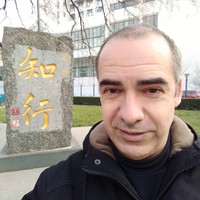
In the current era of the coexistence of multiple civilizations, Chinese sinology studies are focused on rebuilding cultural self-confidence by establishing a sense of modernity and history. On the other hand, Western sinology studies are more concerned with interdisciplinary fields such as politics, philosophy, economics, linguistics, and sociology in an attempt to interpret China comprehensively.
Recently, Rogério Fernandes de Macedo, a Brazilian sinologist, was interviewed by China News Service, describing his experience of retracing the development of Western sinology and explaining the commonalities and individualities of Chinese and Western sinology studies.

What are the qualities of Sinology that attracted you to study it in depth?
I was first introduced to Sinology and Chinese culture through Chinese martial arts films and novels. For me, martial arts was the key to Chinese culture, which contained traditional cultural elements such as etiquette, morality, and martial virtues that captivated me.
Later, I studied martial arts under a master from Shandong, China. One day, my master asked me, “How can you understand martial arts if you don’t understand Chinese martial arts theories and customs?” This sparked my interest in Chinese culture. At first, my understanding of Chinese culture was rather superficial, and it was not until I entered a Chinese school in Brazil that I realized its profundity.
After entering the Federal University of São Paulo, I wanted to do some research on China or Sino-Brazilian relations. At that time I read Mr. Wang Li’s History of Chinese Linguistics, so I had an exchange with Fernanda Miranda da Cruz, a professor of linguistics in Brazil, which in turn gave birth to my two papers to discuss the origin of the mandarin pinyin alphabet and to review the history of chinese language teaching in Brazil.
How has the research work of the Chinese linguist Wang Li helped your sinology studies?
After reading through Wang Li’s History of Chinese Linguistics and watching a documentary on his life, I am impressed by his strong academic conviction and become more and more interested in his research. He lived in a time when technology was not as advanced as it is now, but he overcame all the difficulties to complete tools such as Wang Li’s Ancient Chinese Dictionary and several monographs on linguistics.
Mr. Wang Li not only combined traditional Sinology, which studied language and writing from the perspective of documentary evidence, with modern Sinology but also applied the advanced theoretical tools of linguistics used in Western Sinology, forming his unique research method, which supported the future of Chinese linguistics. This compatible approach to Chinese and Western Sinological theory inspired me to conduct comparative Sinological research at the doctoral level.
How has Sinology in the West contributed to the exchange and mutual appreciation of Chinese culture and Western civilization?
Western Sinology in general can be summarized into three stages: the primitive Sinology stage, the origins of the Sinology stage, and the modern Sinology stage.
In the primitive Sinology stage, with the spread of the Jesuit and the colonial expansion of Europe, Western missionaries crossed the ocean and initiated the collision of ideas between China and the West.
Among them, the Italian missionary Matteo Ricci, based on his understanding of Chinese culture, reconciled Christianity and Confucianism through the strategy of cultural adaptation, while the French missionary Joachim Bouvet aimed to find a worldview consistent with Christianity in Chinese texts such as the I Ching.
In addition, the European mathematician and philosopher Gottfried Wilhelm Leibniz, the founder of primitive Sinology, interpreted Chinese natural theology through the use of canonical texts without ever visiting China and emphasized the importance of cultural exchange between China and the West by drawing an analogy between binary and the yin and yang lines in the I Ching.
At the stage of the origins of Sinology, the French sinologist Jean-Pierre Abel-Rémusat and the German linguist Friedrich Wilhelm Christian Carl Ferdinand von Humboldt engaged in an open discussion on the philosophy of language. They analyzed the grammatical framework of language to explore the relationship between language and thought, but limited their study to Greco-Roman languages with their flexural structure, so Chinese was not included in this discussion. But inspired by Rémusat, Humboldt later turned to Chinese as one of the most perfect languages in the world, and in the early 19th century Rémusat offered the first course on Sinology in Europe, marking its birth as a formal discipline in the West.
In modern times, the French sociologist and sinologist Marcel Granet advocated the use of sociological analysis to study Chinese society, focusing more on objective facts. Nonetheless, he was unable to study outside the Eurocentric framework due to the influence of the critical Chinese philosophical trends of his time.
In my opinion, modern Western Sinology is a very broad and open field of expertise that can contribute not only to the exchange between China and other countries but also to the mutual learning of civilizations.
Do sinology from the West and from China influence and intermingle with each other?
Chinese sinology usually starts with its history and culture and uses the books of ancient and modern Chinese scholars as the basis of its field of study. Western Sinological studies rely mainly on their own constructed knowledge systems and methodologies, and do not take into account the specific social context and historical facts of China.
However, there is no shortage of scholars in Western Sinological studies who are concerned with local Chinese studies and value their traditional cultural values, and they are often respected and recognized by Chinese scholars. Wang Li, for example, speaks highly of the Swedish sinologist Hans Henrik August Bielenstein, saying that he profoundly influenced the development of Chinese linguistics.
Indeed, Chinese sinology has been influencing Western sinology as well. Many ancient Chinese histories were translated and transmitted to Europe by Western missionaries, giving birth to Western sinology in the Eurocentric and Orientalist thinking of the time.
Unfortunately, the criticism of Chinese thought in the history of Western philosophy is still a negative factor for sinology that cannot be ignored, and this influence is still present in the academic environment. It is a great misconception to dismiss Chinese philosophy simply because it is so different from ancient Greco-Roman thought.
Is multiculturalism an appropriate form of cultural intermingling?
Chinese and Western cultures are different due to their unique geographical location, history, and social development. I believe that the intermingling of Chinese and Western cultures depends to a large extent on cooperation between countries; cooperation is possible, but concrete practice is not easy.
If one follows the path of the previous struggle for interests among Western powers and holds Greco-Roman culture as the only paradigm to be followed worldwide, then the intermingling of diverse cultures among nations can only be a huge utopia.
However, if the intermingling of cultures is projected as an exchange between institutions such as schools and companies, it is quite feasible, since both sides share common interests and follow the law of cooperation.
In this respect, the Chinese philosophy of dealing with the world can play an important role, since Confucius and other representatives of the various schools of thought developed their ideas in times of war and pointed to the possibility of achieving peace through education and a suitable political approach. But all this presupposes that more and more people need to recognize and understand Chinese culture.
(Source: China News Service)



